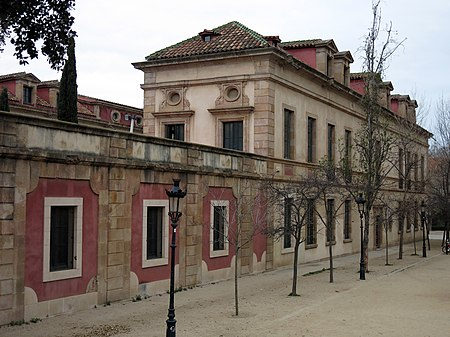ROSA GALLEMÍ BALAGUÉ-ANTONIO PUIG SA 2ND ENTRY
I enclose photos of the newspaper of Merida de Yucatan, Mexico from 1900 where the obituary of my grandfather Joan Balagué is published
MY YOUTH AND THE CIVIL WAR
I studied Primary at the Colegio de las Monjas Dominicas de Santa Eulalia and in the 1930s I studied Baccalaureate at the Institut Escola de la Generalitat de Catalunya, with Conseller Ventura Gassol being one of its main promoters and the Director being the great pedagogue Dr. Josep Estalella i Graells. This institution was a true novelty in the way of teaching, as soon as we followed the classes in the nearby parks in the middle of nature, as we received visits from President Maciá. The classes were mixed, just like the colonies and the girls could attend wearing pants, something absolutely revolutionary at the time. It was one of the happiest stages of my life, until the Civil War of 1936 came and unfortunately it was closed in 1939 by the new regime.
School Institute of Barcelona
Everything was broken when the war came and I could not continue my higher studies, like most of my generation. Fortunately, during the conflict, thanks to the fact that my grandfather Joan Gallemí and paternal uncle Pere Gallemí worked at the Farinera de Sant Andreu, we did not lack food. We were also very lucky with the bombing of Barcelona in March 1938. We were with my father walking through the Plaza de Catalunya and all of a sudden the alarms sounded and bombs began to rain from the sky launched by Mussolini's Italian planes. My father and I began to run like crazy and we separated in the middle of the confusion and until nightfall we did not manage to find each other at home, luckily healthy and alive, unfortunately about 1000 people and more than 100 children died brutally. From this terrible experience my period was withdrawn for months. I also remember that we enjoyed the company of Mossen Pere from the Parish of Sta. Eulalia and during the worst months of the burning of churches at the beginning of the war.
Bombing of Barcelona in March 38
WAR FACTORY No. 7 OF THE GENERALITAT DE CATALUNYA
As soon as the Civil War began, the workers themselves in many cases and the Generalitat de Catalunya in the rest, began to collectivize and appropriate the most important industries in the country, 15 in total within the War Industries Commission of the Generalitat, being one of them of my uncle Francesc Castelló Carreras, cousin brother as I mentioned of Antonio Puig Castelló. The latter, like other companies, was obliged to pay a "revolutionary tax" and himself complained in a letter addressed to the Generalitat, about the frequent visits he received from the militiamen to collect the revolutionary tax. For this reason and in view of the events, Antonio Puig asked my parents and me to go to live and watch over his estate in Sant Genis de Vilassar, which we did unconsciously, due to the danger it represented and in this way take care of it from possible visits from the militiamen, the same ones who completely burned down the town's church. In this way, throughout the war, Antonio Puig remained living in Barcelona and was able to maintain his estate without any danger of being seized or burned by the militiamen.
The Industrias Metálicas Castelló factory, owned by my uncle Francesc Castelló, at the beginning of the war was moved from Guinardó to Denia Street in Sant Gervasi, Barcelona and placed under the orders of Josep Tarradellas, within the War Industries program of the Generalitat and called War Factory No. 7. It was dedicated before to the manufacture of lipsticks among others, and changed its production to ammunition and bullets, being one of the successes of the Generalitat's Comissió d'Industries de Guerra, led by Josep Tarradellas and despite the frequent sabotage that occurred. See TV3 documentary, "From lipstick to the Bullet". Periodically, usually once a month, he visited the factory together with Tarradellas, a Soviet commissioner specializing in this type of production. My father, Joan Gallemí Claveria, worked as an Accountant and myself as an Administrative. I prepared the weekly wages of the 186 workers, most of them fortunate not to have to go to the front and receive a good salary and food stamps if we compare it with the hardships of the rest of the population. Thanks to my situation and the approval of my uncle Francesc Castelló, we were able to hire as essential in our industry and to avoid them going to the front, quite a few people who asked us, usually with serious family problems, I remember the two sisters Mañanas, Mª Luisa Martinez de Subirá, among others. When the war was over. my uncle was able to recover the industry to him and luckily with enough raw material to be able to continue with the production of articles this time for civil use, such as lipsticks among others.
 War Factory No. 7 and its ammunition production
ORIGINS OF ANTONIO PUIG CASTELLO
War Factory No. 7 and its ammunition production
ORIGINS OF ANTONIO PUIG CASTELLO
 Josep Mª Puig 2nd from the left and his father 4th
Josep Mª Puig 2nd from the left and his father 4th.jpg)
.jpg)




Comentarios
Publicar un comentario